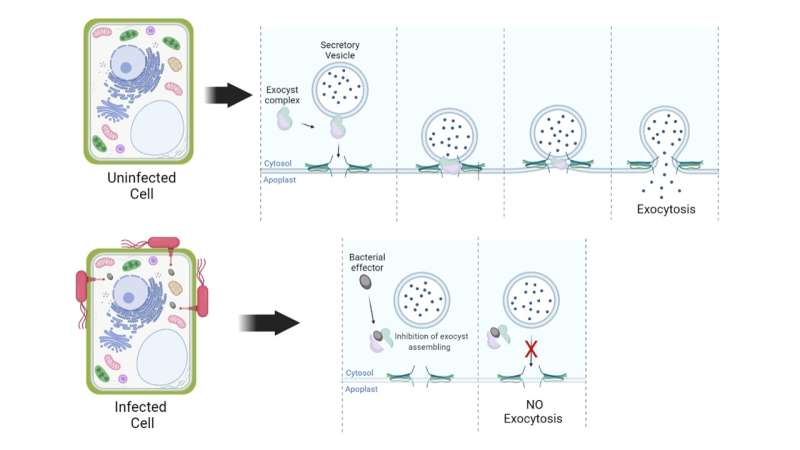Some phytopathogenic bacteria produce an effector protein that inhibits exocytosis by affecting the proper assembly of the exocyst complex. Under normal conditions (A), the exocyst complex is properly assembled to translocate the secretory vesicles to the cell membrane for the secretion of their content into the apoplast. When the cell is infected by the bacterium Xanthomonas (B), an effector protein blocks the proper assembly of the exocyst complex, thereby inhibiting the process of extracellular secretion. Credit: Foundation for Research and Technology – Hellas
In nature, there is a constant evolutionary battle between microbes and their hosts, during which many bacteria secrete specific proteins into the host's cells, aiming to alter its physiology while increasing pestiferous activity.
A recent research article, published in The Plant Cell, reveals that some phytopathogenic bacteria use specific virulence proteins to inhibit the exocyst-dependent secretion machinery of the host cells. The research was conducted by the group of Professor Panagiotis F. Sarris at the University of Crete.
Pathogenic bacteria, of both plants and animals, use common strategies to infect their hosts. During infection, the exocyst-dependent secretion machinery plays a crucial role in the host cells' defense, by secreting specific antimicrobials into the extracellular space and translocating immune receptors at the plasma membrane, in order to inhibit the growth of pathogens.
This study revealed a hitherto unknown strategy of economically important pathogenic bacteria of Xanthomonas genus, which use a specific virulence protein (effector) that interferes with the assembly of the exocyst protein complex, in order to inhibit the exocyst-dependent secretion mechanism of the host cells.
"Our study was carried out in the Arabidopsis thaliana model-plant, which appears to be an excellent model for the study of bacterial pathogenesis, and revealed that some microbes manages to inhibit exocyst complex by tricking the host's immune system. It is noteworthy that exocyst inhibition by the bacterium Xanthomonas occurs without activating the mechanisms of the host's defense," said Professor Panagiotis Sarris and Dr. Vassiliki Michalopoulou, postdoctoral collaborator of the team of Prof. Sarris and first author of this publication.
The research team continues to study the mechanism of microbial interference to the exocyst-dependent secretion machinery. Scientists point out that, due to the maintenance of the exocyst complex in higher eukaryotic organisms, there is evidence that this newly discovered inhibition mechanism is a strategy of many other pathogens of both plants and animals.
More information: Vassiliki A Michalopoulou et al, The host exocyst complex is targeted by a conserved bacterial type-III effector that promotes virulence, The Plant Cell (2022). DOI: 10.1093/plcell/koac162
Journal information: Plant Cell
Provided by Foundation for Research and Technology - Hellas
























